Related Research Articles
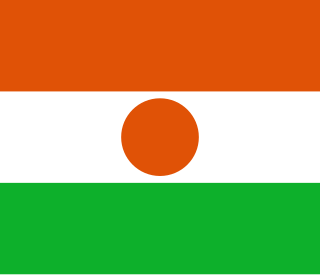
Niger or the Niger, officially the Republic of the Niger, is a landlocked country in West Africa named after the Niger River. Niger is bordered by Libya to the northeast, Chad to the east, Nigeria to the south, Benin and Burkina Faso to the southwest, Mali to the west, and Algeria to the northwest. Niger covers a land area of almost 1,270,000 km2 (490,000 sq mi), making it the largest country in West Africa. Over 80% of its land area lies in the Sahara Desert. The country's predominantly Muslim population of about 22 million live mostly in clusters in the far south and west of the country. The capital and largest city is Niamey, located in Niger's southwest corner.
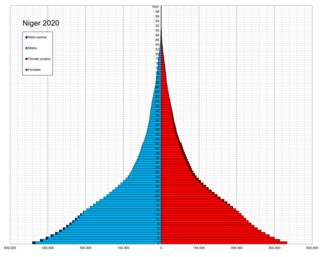
This article is about the demographic features of the population of Niger, including population density, ethnicity, education level, health of the populace, economic status, religious affiliations and other aspects of the population.

The economy of Niger is based largely on internal markets, subsistence agriculture, and the export of raw commodities: foodstuffs to neighbors and raw minerals to world markets. Niger, a landlocked West African nation that straddles the Sahel, has consistently been ranked on the bottom of the Human development index, with a relatively low GDP and per capita income, and ranks among the least developed and most heavily indebted countries in the world, despite having large raw commodities and a relatively stable government and society not currently affected by civil war or terrorism. Economic activity centers on subsistence agriculture, animal husbandry, re-export trade, and export of uranium.
Telecommunications in Niger include radio, television, fixed and mobile telephones, and the Internet.
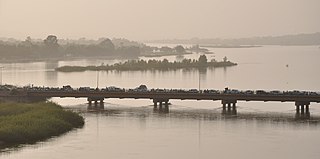
The Niger River is the principal river of West Africa, extending about 4,180 km (2,600 mi). Its drainage basin is 2,117,700 km2 (817,600 sq mi) in area. Its source is in the Guinea Highlands in southeastern Guinea. It runs in a crescent through Mali, Niger, on the border with Benin and then through Nigeria, discharging through a massive delta, known as the Niger Delta, into the Gulf of Guinea in the Atlantic Ocean. The Niger is the third-longest river in Africa, exceeded only by the Nile and the Congo River. Its main tributary is the Benue River.
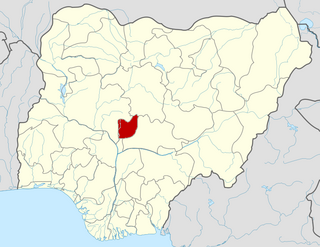
The Federal Capital Territory, commonly known as FCT, or loosely as FCT-Abuja, is a federal territory in central Nigeria. Abuja, the capital city of Nigeria, is located in this territory. FCT was formed in 1976 from parts of the states of old Kwara, Niger, Kaduna and Plateau States with the bulk of landmass carved out of Niger State. It is within the Middle Belt region of the country. Unlike the States of Nigeria, which are headed by elected Governors, it is administered by the Federal Capital Territory Administration, headed by a minister appointed by the President.
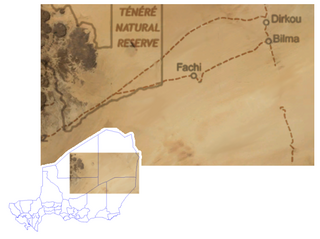
Bilma is an oasis town and commune in north east Niger with, as of the 2012 census, a total population of 4,016 people. It lies protected from the desert dunes under the Kaouar Cliffs and is the largest town along the Kaouar escarpment. It is known for its gardens, for salt and natron production through evaporation ponds, date cultivation, and as the destination of one of the last Saharan caravan routes.
The National Center for Education Statistics (NCES) is the part of the United States Department of Education's Institute of Education Sciences (IES) that collects, analyzes, and publishes statistics on education and public school district finance information in the United States. It also conducts international comparisons of education statistics and provides leadership in developing and promoting the use of standardized terminology and definitions for the collection of those statistics. NCES is a principal agency of the U.S. Federal Statistical System.

Niger is a state in the Middle Belt region of Nigeria and the largest state in the country. The state's capital is at Minna. Other major cities are Bida, Kontagora and Suleja. It was formed in 1976 when the then North-Western State was bifurcated into Niger State and Sokoto State. It is home to Ibrahim Babangida and Abdulsalami Abubakar, two of Nigeria's former military rulers. The Nupe, Gbagyi, Kamuku, Kambari, Hun-Saare, Hausa and Koro form the majority of numerous indigenous tribes of Niger State.
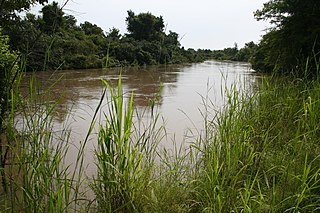
The W National Park or W Regional Park is a major national park in West Africa around a meander in the River Niger shaped like the letter W. The park includes areas of the three countries Niger, Benin and Burkina Faso, and is governed by the three governments. Until 2008, the implementation of a regional management was supported by the EU-funded project ECOPAS. The three national parks operate under the name W Transborder Park.. The section of W National Park lying in Benin, measuring over 8,000 km2 (3,100 sq mi), came under the full management of African Parks in June 2020. In Benin, W National Park is contiguous with Pendjari National Park which is also under the management of African Parks.

Agadez Region is one of the eight Regions of Niger. At 667,799 square kilometres (257,839 sq mi), it covers more than half of Niger's land area, and is the largest region in the country, as well as the largest African state subdivision. The capital of the department is Agadez.
The Niger national rugby union team represents Niger in international rugby union. Niger are a member of the International Rugby Board (IRB), and have yet to play in a Rugby World Cup tournament. Niger were the runner up to Tanzania in the CAR Castel Beer Trophy in 2006, but won the northern section.
Law enforcement in Niger is the responsibility of the Ministry of Defense though the National Gendarmerie and the Ministry of the Interior through the National Police and the National Guard, a paramilitary police force.
The Baháʼí Faith in Niger began during a period of wide scale growth in the religion across Sub-Saharan Africa near the end of its colonial period. The first Baháʼís arrived in Niger in 1966 and the growth of the religion reached the point of the election of its National Spiritual Assembly in 1975. Following a period of oppression, making the institutions of the Baháʼí Faith illegal in the late 1970s and '80s, the National Assembly was re-elected starting in 1992. The Baháʼí community in Niger has grown mostly in the south-west of the country where they number in the low thousands. The Association of Religion Data Archives estimated some 5,600 Baháʼís in 2005.
The Institut national de la statistique et de l'analyse économique (INSAE) is a national institute of Benin, which is dedicated to collecting data in the country. It collects data on demographics, population, climatology, education, employment, etc.

Parliamentary elections were held in Niger on 14 February 1993. They were the first multi-party elections in the country since independence in 1960, and followed constitutional changes approved in a referendum the previous year. Although the ruling National Movement for the Development of Society won the most seats, several opposition parties formed the Alliance of the Forces of Change following the elections, between them controlling 50 seats. Voter turnout was just 32.7%.
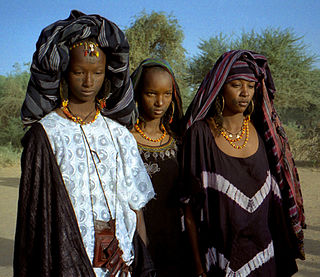
Women in Niger are women that are from or live in the West African country of Niger. These women belong to a population in which 98% are practitioners of Islam. Most of the laws adopted by the government of Niger to protect the rights of Nigerien women are most of the time based on Muslim beliefs.

China–Niger relations refer to the foreign relations between China and Niger.

Visitors to Niger must obtain a visa from one of the Nigerien diplomatic missions unless they come from one of the visa exempt countries.
References
- ↑ Dofonsou, Sika Gbegbelegbe (2008). Ex Ante Economic Impact of Bt Cowpea in Nigeria, Niger and Benin. ProQuest. p. 58. ISBN 978-1-109-78515-9 . Retrieved 2 May 2013.